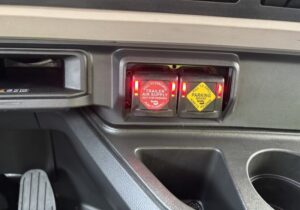If drivers often feel ignored while at facilities while they are loading or unloading freight, well … it’s because they are.
Most workers at these facilities are focused on meeting deadlines and satisfying their own customers, in addition to tending to incoming or outgoing freight. Other than opening doors, putting the truck in the right spot for unloading and presenting paperwork, drivers are typically ignored.
Unfortunately, drivers that DO get noticed by their customers when picking up or dropping off freight are often conspicuous for the wrong reasons. Defective equipment, incorrect or missing paperwork, and inappropriate behavior quickly attract the attention of shippers and receivers — and not in a good way.
There are, however, actions every driver can take to maintain and improve their relationships with the customers they serve.
Punctuality is paramount. In the “just in time” environment in which many businesses operate these days, missing an appointment can impact schedules far beyond your own. Inventories are often kept low to save the expense of handling and storage. Assembly lines can’t operate without parts, and warehouses can’t fill orders without product to select from.
Get there on time. If you can’t, provide as much notice as possible so alternate arrangements can be made.
Customers usually understand that legitimate reasons sometimes exist for late pickups and deliveries. However, make sure your reasons don’t sound like excuses. All of the other trucks arriving at the facility experienced bad weather and heavy traffic too, so if they made it on time, your explanation may ring hollow.
Regardless of the reason, remain courteous and apologetic, even if it wasn’t your fault.
Equipment is another area of focus. While some drivers believe shiny tractors with lots of chrome are the way to convince customers of the quality of their services, it’s rare for a customer to even step outside to view a driver’s motorized utopia. It’s the other end of the truck that gets the most attention.
Customers want to know the freight they are shipping or receiving is safe and well cared for. A dirty trailer with obvious damage that can snag boxes of freight being loaded can be cause for concern to some. Holes in the trailer’s sides and roof, especially if the trailer is showing signs of water leakage, can cause shippers to refuse to load and receivers to reject deliveries.
Make sure the trailer you’re using is in good repair and is clean. Sweep it out, if necessary.
Paperwork is a part of the job, and the way yours is presented can say a lot about your professionalism. If you bring in a manifest and accompanying documents stacked in a haphazard pile, out of order and coffee-stained, the receiver may wonder if you treated their product with the same degree of care. They might also wonder if any of the documents on which they depend are missing or damaged.
It doesn’t take a lot of effort to stack paperwork neatly and in the correct order. A clipboard or paperwork organizer can help keep everything in order and just looks better, too.
Your personal appearance can also make a difference, and an important one, at that.
The hectic schedule of a professional driver can make it difficult to find time for personal hygiene, but if you show up looking like the town bum you won’t get favorable results. There may not be time for a shower and shave, but a clean face, a relatively clean shirt and some deodorant can make all the difference.
Keep in mind that what you wear can change attitudes. If your favorite T-shirts are printed with messages or slogans that are in poor taste, that promote illegal activities or advertise alcoholic or other products, it’s probably best to save those shirts for the right environment. Political messages on clothing are nearly guaranteed to alienate 50% of the people you deal with, so save the campaign materials for your off hours.
Body decorations — such as piercings and tattoos — are more popular than ever, and are widely accepted in society these days. But, there is always “that one person” who has to push the boundaries by choosing decorations that are guaranteed to offend someone. Tattoos featuring naked women, curse words, swastikas or other designs that might offend are better covered up while at a customer’s location.
Attitude is another thing that can attract the customer’s attention, either for better or for worse.
Dock employees are totally unaware of the perils and frustrations you faced to get their freight to them. They don’t know about the traffic jams, the DOT inspection, the unreasonable dispatcher, the mechanical problems or the weather. They aren’t aware of the argument you had with your spouse or whatever other problems that may have soured your mood.
They’re just doing their job, and they expect the same from you. If you allow your bad mood to impact the way you treat others, don’t be surprised if they don’t bend over backwards trying to please you.
Dock workers and office personnel can’t do a thing about your life on the road, but they CAN impact how quickly you get loaded or unloaded — or if it even happens at all. Arguing, especially in a loud voice with plenty of “salty” expressions thrown in, won’t make things go any smoother.
In addition, keep in mind that dock workers have knowledge of their business that you don’t have. A delay in unloading, for example, can occur because the forklift driver is waiting for warehouse space to open up. A loading delay could be because they found a damaged pallet of freight and are preparing a replacement.
It’s OK to ask questions, but complaining will usually only make the problem worse.
If you run your own small trucking business and the customer is YOUR customer, prompt billing and good communication go a long way towards customer satisfaction. If you value the customer’s business, show it. If your customer is a broker or another load source, remember that they need satisfaction, too.
The basics of customer service are the same for just about any business.
Do what you say you’ll do, when you say you’ll do it. Be polite and professional. Show empathy for your customer’s business, whether your customer is your carrier, a broker, or a direct relationship with a shipper or receiver.
Business empires have been built on great customer service. It’s a good practice to build yours accordingly.
Cliff Abbott is an experienced commercial vehicle driver and owner-operator who still holds a CDL in his home state of Alabama. In nearly 40 years in trucking, he’s been an instructor and trainer and has managed safety and recruiting operations for several carriers. Having never lost his love of the road, Cliff has written a book and hundreds of songs and has been writing for The Trucker for more than a decade.















